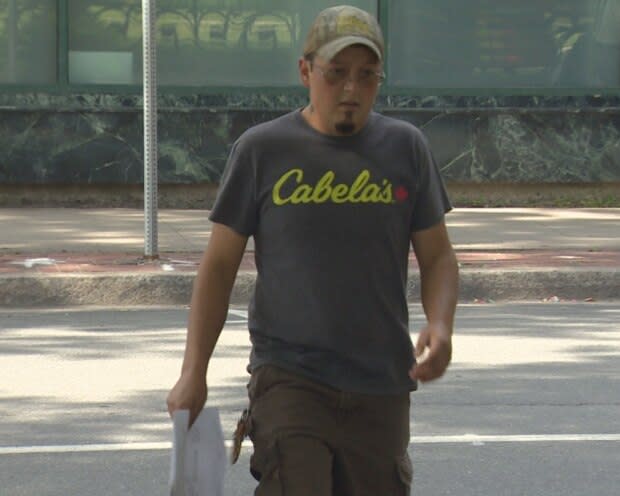Wolastoqew loggers face charges of unauthorized timber harvesting in New Brunswick
Three members of a First Nations firewood harvesting association are facing charges in New Brunswick provincial court of illegally harvesting timber from Crown lands.
One of the men charged, Patrick Paul of St. Mary's First Nation in Fredericton, was the subject of an investigation earlier this year by New Brunswick conservation officers.
At the time, Paul said he believed the officers were targeting his clients to eliminate the market for First Nations harvested firewood, and by not charging him, were deliberately disallowing him the chance to use Aboriginal rights in a court defence.
The Wabanaki Loggers, most of whom run individual firewood operations, harvest the timber from areas of western New Brunswick in their traditional Wolastoqew territory, without provincial logging licences, to sell to Indigenous and non-Indigenous clients nearby. Their timber typically comes from woodlots designated by the province as Crown land.
Paul said he was working in his woodlot on Aug. 13 when he received a call from New Brunswick's Department of Natural Resources asking to meet with officers to receive his notification to appear in court.
He's been charged under the Crown Lands and Forests Act under the section regarding unauthorized cutting, removal or possession of timber.
"It was no big surprise. I guess I knew it was coming," said Paul.

The minimum fine for that offence is $1,000, but according to that act, if a judge decides that a person cut timber from Crown land "for financial advantage," the minimum fine is $10,000.
Paul said the impending court proceeding hasn't changed his mind on how he's earning a living.
"I think everyone should just continue on," he said.
"We'll fight it in court and we'll win and go back to what we were doing originally, before we were bothered."
'Being treated like we're criminals'
Jeff Tomah, a councillor at Woodstock First Nation and spokesperson for the Wabanaki Loggers, was charged the same day as Paul for unauthorized possession of timber from Crown land.
A third Wolastoqew logger from Woodstock First Nation has also been charged.
"I suppose it's just another day in the life of our folks, out exercising our constitutionally protected rights," Tomah said.

"Here we go again, we have to march in the court system ... being treated like we're criminals just for getting up in the morning, putting your work boots, going to work and trying to make your life better."
Tomah said he's been logging for close to 30 years in the territory, throughout his previous tenures as a councillor and chief of Woodstock First Nation.
Among other cases, Tomah said a Supreme Court of Canada ruling in a New Brunswick case in 2006, known commonly as the Sappier-Polchies case, paved the way for the Wabanaki Loggers to make their living by harvesting in the unceded territory.
In that case, two Wolastoqew loggers and a Mi'kmaw logger were facing charges for possession and cutting of timber from what was considered to be Crown land.
The Supreme Court concluded that the men had an inherent right to harvest wood in their traditional territories for domestic use in their own communities, but not for financial gain.
On Wednesday, the trio's lawyer Maria Henheffer told Justice Mary Jane Richards she needs time to review the Crown's disclosure.
"[This is] a complicated Aboriginal rights issue," Henheffer said.
Richards set the matter over to Nov. 20, when the three are expected to enter a plea.

